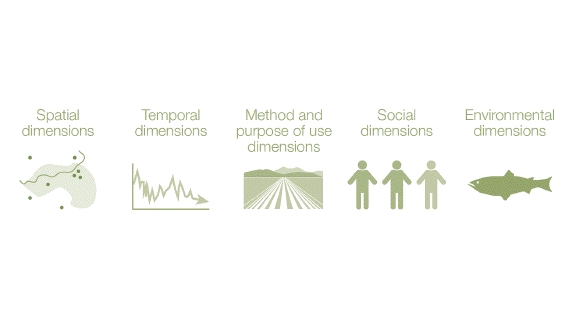Risks and externalities demand careful and inclusive design
By Nell Green Nylen and Michael Kiparsky
With markets increasingly viewed as a preferred (or even the only) solution to water challenges, faith in market efficiency must be tempered with a firm grasp of the larger physical and institutional context for water.
Take groundwater, a crucial lifeline for human and environmental well-being around the globe. In many areas, unfettered pumping has depleted aquifers, resulting in dry wells, deteriorating water quality, depleted streams, and damage to surface infrastructure.
Part of the solution may lie in markets–which can be remarkable engines for efficiently enabling the reallocation of limited resources, sometimes in ways that benefit society and the environment. Transfers of groundwater-use entitlements could potentially help water users adapt to the pumping restrictions needed to shift overdrafted basins toward sustainability.
Yet markets are never a panacea. If not implemented with care and deliberation, market missteps can generate harmful unintended consequences that could reverberate far into the future.
Our recent work has illustrated the potential limits of newly emerging groundwater markets in California, but the general lessons and observations have relevance to water markets taking shape all over the world.
Risks and key considerations
Water markets are only a means to achieve a desired end. An essential, yet often neglected first task, is to explicitly identify and articulate the intended goals of a market. Without that yardstick for success, it is hard to assess market effectiveness or make course corrections when needed.
Transactions that benefit market participants can injure third parties and impede broader sustainability goals. These unintended consequences, or externalities, can result from poorly designed or implemented markets. Because trading changes where, when, and how groundwater is pumped and used, it can alter the social and environmental impacts of pumping and using groundwater (see Figure 1). Unrestricted trading can concentrate pumping in “hot spots” that harm groundwater-dependent communities and ecosystems. Markets can affect different communities, population segments, ecosystems, and species in ways that may be difficult to predict and require great care to manage and mitigate.
Markets do not exist in a vacuum. Like other management tools, markets must be reconciled with applicable legal and institutional constraints. For example, layering a secondary system of tradeable allocations on top of existing groundwater rights could be legally and politically risky. In jurisdictions like California where the most common type of groundwater right is based on land ownership and cannot be transferred separately from that real estate, water rights law could be a significant obstacle for markets.
A water market is only as socially equitable and ecologically protective as it is designed to be. To prevent unacceptable trading impacts, markets will need unambiguous rules, backed by effective oversight and enforcement. Rules can be tailored to minimise the negative, and maximise the positive, impacts of trading. For example, trading ratios–rules which entitle the buyer to pump a different amount of groundwater than the seller could have pumped–can be designed to reflect the relative impacts of pumping and use in the buyer’s and seller’s locations.
Tracking market transactions and the broader impacts of markets will require constant oversight and verification, based on regular monitoring and measurement.
Crucially, those participating in a groundwater market will need to measure and report their pumping to the market authority. This can be controversial, particularly where metering has not been previously required. But the information provides essential context for market transactions (as well as for establishing and enforcing the overall pumping limits and individual pumping allocations that make trading possible).
The distributional implications of markets—where benefits are likely to accrue and burdens are likely to fall—should inform decisions about whether and how to implement specific trading programmes. The models used by many economists are agnostic on this point but human nature and community values are not. Market structures, including initial pumping allocations, and the costs of competing effectively in a market, may allow entrenched interests to consolidate power. Where this happens, markets could lose legitimacy and may breed resistance, or even litigation, from those who perceive themselves as losing out.
The effort to meaningfully address these considerations will increase the transaction costs associated with using markets as a water management tool. Significant physical, technological, and managerial infrastructure will be needed to design and implement a market that furthers sustainable management. Markets are not ‘free.’ So it is important to factor the inevitable transaction costs, along with explicit understanding of who will pay them, into decision making.
Managing risks
Markets may be one of the tools that enables better water management. In some cases, markets will help achieve sustainability more efficiently than regulations alone. But proponents should recognise that success is not guaranteed, and high-profile market failures–such as the problems currently unfolding in the Murray-Darling Basin of Australia–could damage the prospects for future markets.
Getting markets right will require hard work, careful planning, and adaptive management. Markets should receive the same scrutiny as other management options. Proponents need to seriously analyse not just how a market will generate efficiency and create wealth but how it will advance sustainability and avoid harmful externalities (see Figure 2).
Two vital parts of the equation are transparency and robust, inclusive stakeholder engagement. Together, they can elevate community concerns early on, as well as generate creative ways of addressing those concerns. It may take longer on the front end, but will facilitate stakeholder buy-in and reduce the likelihood of future legal and political challenges.
Faith that markets will produce positive outcomes is not an effective risk management strategy. Instead, intellectual honesty and the acute need for sustainable water management demand that we acknowledge and address the limitations of markets with the same enthusiasm with which we trumpet their potential benefits. Trust in market-based programmes must be earned.
Nell Green Nylen is a senior research fellow at the Wheeler Water Institute at the Center for Law, Energy & the Environment at UC Berkeley School of Law.
Michael Kiparsky is director of the Wheeler Water Institute, and a co-director of UC Water.








